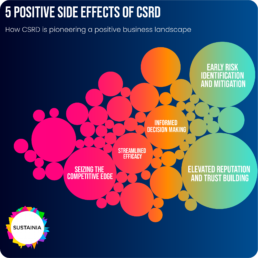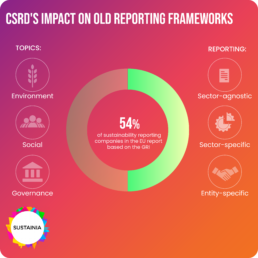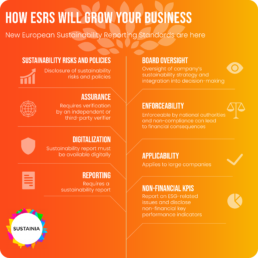Sustainia Simplifies
5 positive side effects of CSRD

CSRD implementation for the faint of heart – this is how you embrace the five positive side effects of CSRD.
As you may be aware, the Corporate Sustainability Reporting Directive (CSRD) is set to directly affect 50.000 companies – including large companies in the EU, companies listed on EU-regulated markets, and non-EU companies with branches or subsidiaries in the EU.
Use communications creatively
At Sustainia we are committed to helping businesses transition to CSRD. Based in research and analyses, we use creative communications to provide guidance on selection and implementation of the most appropriate and relevant parts of CSRD and ESRS – European Sustainability Reporting Standards. Additionally, we offer support in data collection and reporting to ensure that your organisation’s sustainability efforts are accurately reflected and communicated. This is a collaborative effort which can be arduous but nonetheless quite enjoyable.
CSRD mandates companies to document and report a wide range of sustainability issues based on the guidelines set out under the ESRS starting from 2024.
While CSRD may be a bewildering construct, it is here to stay. It will fuel the momentum and be a gift that keeps on giving for the companies that are all in on the green transition. It will help them keep ahead. For those on the fence it is tempting to view it as another layer of bureaucracy and overhead they never volunteered for. And lots of companies and lots of employees will be on the fence.
Being the ambitious leader you obviously are, you need a lot of convincing to get people onboard, and adapt to the new reality.
Ambition is motivating
As you set out to plan for its implementation, be aware that ambition is more motivating for an organisation than merely scraping by to meeting the minimal requirements. No one has ever been motivated by being second in a race between the best and the rest. The problem is, however, that as we help global companies translate what CSRD actually means we haven’t met anyone yet that fully understands and appreciates its ramifications.
So we have applied our expertise in producing marketing and communications materials that educate employees and suppliers, be it educational articles, webinars, presentations or infographics.
We believe that implementing CSRD has at least five positive side effects:
-
Doing CSRD well will significantly boost your reputation, helping gain trust from stakeholders, investors, and customers. Demonstrating a strong commitment to sustainability showcases a sense of responsibility, which resonates well with the public.
-
Acting on CSRD now, and not waiting until it’s your turn, gives you a competitive advantage. As sustainability becomes increasingly important, organisations that adopt advanced reporting frameworks stand out from their competitors. This differentiation allows you to attract investors, retain employees, and secure customers who prioritise sustainability in their decision-making.
-
You’ll improve your decision-making. This standardised step up the environmental ladder of sustainability reporting ensures that you will have a thorough understanding of your social, environmental, and economic impacts. We would claim this allows for better informed decisions and strategies to address sustainability challenges.
-
CSRD will prompt you to identify and address potential risks early on, such as regulatory changes, supply chain disruptions, or reputational damage. Proactively managing these risks can reduce costs and prevent negative impacts on your business. Check out our work on double materiality, by the way.
-
And you’ll be more efficient in the process, while possibly saving money. We suspect that CSRD will lead to the identification of opportunities for efficiency improvements and cost savings. By monitoring resource usage, waste, and emissions, you can uncover areas where you can reduce your environmental footprint while also saving money.



